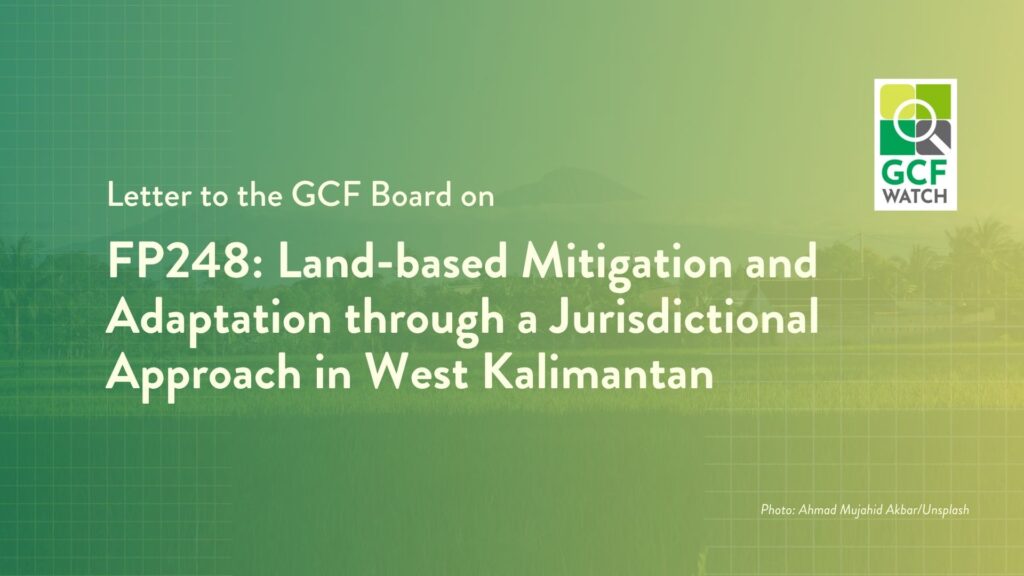CSO Update on the 33rd Green Climate Fund Board Meeting – Day 4
 Full transcript of GCF Observer Network interventions here:
Full transcript of GCF Observer Network interventions here:
Update prepared by The Asian Peoples’ Movement on Debt and Development (APMDD).
-
The last day of B33 started with the adoption of the co-chairs’ proposals on matters related to the GCF’s Risk Management, which is under the Reports on the activities of the Secretariat. It can be recalled that on Day 3, the Board discussed the Secretariat’s recommendations to address risks related to currency fluctuation and speeding up the accreditation master agreement (AMA) signing process.
The suggestions of the BM from Pakistan, as well as the newly suggested timeframe for the implementation of the hedging strategy by the BM from Luxembourg, were included in the decision text. The Board then adopted the decision text which requested the Secretariat to develop a local currency financing pilot, a hedging strategy for GCF contributions, and an increase in the GCF’s foreign exchange buffer to USD 320 Million from the current USD 150 Million.
-
This was followed by an executive session of the Board to discuss the Reports from Board Committees, Panels, and Groups. As the matter was deemed confidential, active observers were asked to leave the Boardroom and the webcast was temporarily suspended.
-
As matters related to FP181 that were discussed by the Board since Day 1 were also considered confidential, the Board continued its closed-door session to discuss the remaining decisions under Consideration of Funding Proposals.
During the discussions, the Active Observers from both the CSOs and PSOs were not allowed to join, but information about the approval of the controversial FP190: Climate Investor Two, by the Dutch Entrepreneurial Development Bank (FMO) have circulated in the GCF’s Twitter account. It can be recalled that on Day 2, FP190 garnered several contentions from the Board due to its financial instrument “reimbursable grants.” BMs from developing countries were apprehensive as the FP might set a precedent on financial instruments supported by the GCF. This suspicion stems from the fact that FMO, a private sector IAE, should not be receiving grants since grants are supposed to be for the public sector and adaptation projects. Other BMs also raised the potential environmental and social risks from the FP.
According to AOs outside the Board room, the FPs were most likely approved within 5 minutes of the executive session. It should be noted that in the GCF history, no FPs have been approved during executive sessions. As there were no follow-ups after the executive session it can be assumed that FP190 was approved, based on the GCF’s announcement in their website and social media. However, no information was circulated about the resolution of the request on FP181’s waiver of conditions.
-
The executive session continued and included discussions on the Selection of the heads of Independent Units and the Selection of the Executive Director. Active observers were still outside the Boardroom and the webcast was still suspended.
-
The sessions resumed with the Board discussing outstanding matters related to the Consideration of Accreditation Proposals. Both Civil Society and Private Sector AOs took the opportunity to deliver an intervention decrying the Board’s lack of transparency and accountability by approving FP190 during the executive session.
CSO AO for developed countries Erika Lennon stressed that FPs should never be approved in executive sessions and that, in doing so, the GCF only makes transparency and accountability a lip service. She added that funding proposals concern lives, and deciding on it privately further endangers the lives of people and communities of the Global South. These points were echoed by the Private Sector AO Margaret-Ann Splawn and also raised concerns about not knowing what conditions, if any, were imposed along FP190’s approval, which, she stressed, is a private sector-proposed FP.
As certain textual edits were recommended by different BMs to the decision text of the reaccreditation of the Asian Development Bank (ADB) and European Bank for Reconstruction and Development (EBRD), the co-chairs presented for adoption a new draft decision text. The Board approved the reaccreditation of the ADB, EBRD, and the United Nations Environment Programme (UNEP). They also approved the requests for upgrades by the UNEP and the World Food Programme (WFP).
-
The Board also discussed the Overall Review of the GCF Policy Frameworks, which is an information document that the Board should take note of. The review was an exercise conducted by the Secretariat as part of the 2020-2023 Board work plan to take stock of the context for policy development and implementation at the GCF, and examine the coherence, implementation and impact of GCF policies. The report includes recommended areas of action, some for implementation by the Secretariat and others for the Board’s consideration as part of updated strategic planning and Board work planning.
The review noted the following points:
- The GCF has not further elaborated a policy taxonomy, classifications or policy responsibilities. Currently, 9 different types of documents are treated as ‘policies’ and 10 GCF bodies or combinations of bodies have been given policy-development responsibility. This has led a multiplicity of policy pathways and to various interpretations and potential implementation of such policies.
- Compared to other organizations (i.e. GEF, CIF, AF), the GCF policies cover similar scopes, but the Fund tends to be more elaborate and apply a wider set of partners that makes the implementation of policies more complex.
- In terms of completeness and coherence, the review confirmed that the GCF policies are very much aligned with the Fund Governing Instrument. There are however specific areas where no policy has been adopted to implement areas of fund operations (i.e. alternative contributions, programmatic approach and hedging) to which the review considers as “policy gaps.” While there is no direct incoherence among the existing policies, the Secretariat confirmed that the Fund’s policies tend to be too difficult to navigate and apply, which reinforces the perception of policy incoherence.
- In terms of consistency of implementation, there are significant challenges identified stemming from policy ambiguity that leads to inconsistent interpretation, unclear implementation roles, limited capacity and training and unimplementable requirements.
- As for the impact of the policies, the Secretariat noted that the policies are perceived to be contributing positively to delivery and ‘raising the bar.’ However, there are still relevant areas identified to be weak in supporting strategic priorities and these are on the private sector mobilization and country ownership. Bottlenecks and inconsistency with regards to policy interpretation and FP reviews and legal agreement negotiations were also noted, to which the need to conduct regular reviews and evaluation of policy performance is considered important.
The Secretariat also presented the recommendations derived from the review:
- Formalize a fund-wide development and implementation framework to establish policy classifications and relationships between instruments, and systematize roles and responsibilities
- Normalize consistent policy processes and templates Fund-wide including pre- and post-approval implementation planning.
- Recalibrate the legacy policy agenda in the Board workplan to prioritize policy gaps and retire irrelevant mandates
- Integrate action to resolve policy conflicts (i.e. policy review/update)
- Rationalize future policy reviews and approaches consistently by resetting the large number of adhoc mandates to follow a more regular cycle, review linked policies as suites and standardize ToR to examine coherence, implementation and impact issues more consistently.
- Enhance consistency of policy implementation through a combination of clarifying policies and elaborating operational guidance/tools to promote more consistent policy application.
- Implement retrospective planning to pick up the limited number of unactioned mandates.
- Improve accessibility of policy resources by making GCF policies more navigable and preparing user-friendly guides.
- Build policy capacity and literacy within the Fund and with GCF’s partners through a combination of knowledge work and capacity-building.
Many of the BMs seemed happy with the results of the review, especially noting that the policy gaps in the Fund are slowly being addressed. Developed country BMs believe this is a good step especially for the Board to work on its Updated Strategic Plan as well as the launch of the GCF-2. However, BM from Switzerland argued that while the GCF may have a number of policies approved, the quality of these policies measured by effectiveness in implementation, must be ensured. BMs from Sweden and Germany concurred and reminded the Board that a number of outstanding policies remain unresolved, especially the one related to Private Sector mobilization, which they both believe must be prioritized. BM from Sweden added that addressing the policy gap related to the Private Sector will help the GCF become a major player in the whole financing architecture.
Developing country BMs also sent positive feedback after hearing that the policy gaps of the Fund are not starting to improve. They also believed the results of the review and the GCF’s set of policies must be easily accessible, as navigating through the wide array of policies remains a challenge. BM from Bhutan on the other hand, asked the Secretariat to verify the findings of the review with the recommendations and evaluations of the IEU, to which the Secretariat responded and explained that they did consult with the IEU, but they were aware that the scope of the review is different.
The Board also heard the CSO Intervention delivered by Kairos dela Cruz, the Alternate Active Observer of developing country CSOs. While the CSOs welcomed the review of the GCF policies and believe the findings will lead to the strengthening of the GCF as an institution in terms of function and impact, we raised our concerns that the survey of external partners completed as part of this review did not include observers. The need to reflect best practices for policy development, especially for the launch of GCF-2, was mentioned in the intervention.
-
The Board went back to resolve outstanding items opened in the last two days of B33. The 11th Report of the GCF to the COP had very few textual edits and was easily adopted without further comments from the Board. On the Guidance and Approach and Scope to Providing Support to Adaptation Activities, changes were made in the decision text, which had additional paragraph that says “the GCF will provide simplified and improved access to funding, including direct access, basing its activities on a country-driven approach and will encourage the involvement of relevant stakeholders, including vulnerable groups and addressing gender aspects.” While there were no objections to these changes, some developed country BMs led by the US, made a statement.
The BM from US believes scaling up resources for adaptation is critical, but he wanted to put on record that the decision neither prejudices the deliberations nor prejudices the outcomes of ongoing policy development processes including the review of the RPSP, the Accreditation Strategy or the Updates Strategic Plan. BMs from Spain, Switzerland and Germany expressed their support for this statement.
For the CSO Intervention, Eileen Cunningham of developing country CSOs, pointed out that the proposed additional paragraph must not only say vulnerable groups, but should explicitly include indigenous peoples, to emphasize the importance of their participation and meaningful engagement in the adaptation approach.
After hearing all comments, the Board approved the document.
-
As most of the agenda items were resolved during a very long executive session, the co-chairs went to Close the 33rd Board Meeting thanking the BMs for being cooperative and for adopting major Board decisions. It should be noted however, that many agenda items under the Provisional Agenda adopted by the Board, were never opened during B33. These include the Reports of the Co-chairs, and the Reports of the Independent Units, among others.
B33 was adjourned at 4:00PM, Korea time.








